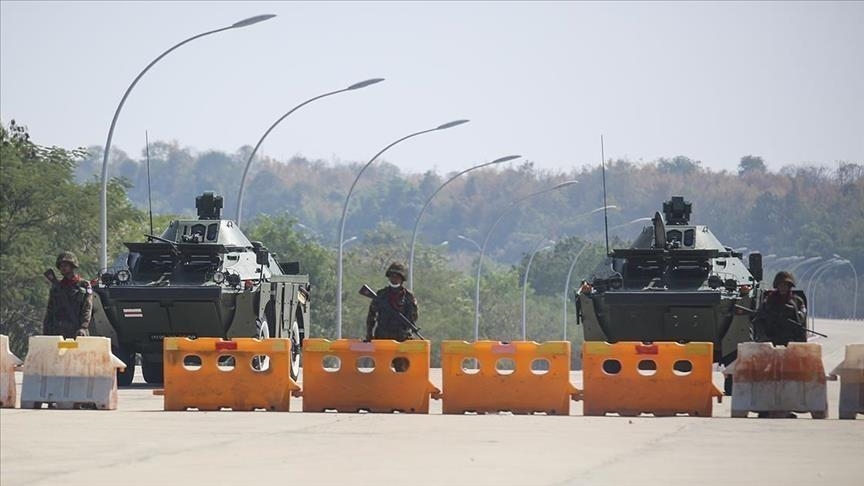Rohingya say coup in Myanmar obstacle to repatriation
We cannot return to Myanmar under rule of our 'killers,' says refugee in Bangladesh
 Photo : File Photo/AA
Photo : File Photo/AA
DHAKA, Bangladesh
Rohingya Muslims living in crammed refugee settlements in Bangladesh say the Feb. 1, 2021 military coup in Myanmar is an undeniable barrier to sustainable repatriation to their homeland.
"What little trust we had in the Myanmar army has fully faded out due to the post-coup oppressive moves," said Mayyu Khan, a refugee.
Myanmar's democratically elected leader Aung Suu-Kyi was ousted and jailed in the coup, along with many of her party's leaders.
Khan added that the escalating tensions has made repatriation of Rohingya almost impossible.
He went on to say that for voluntary and peaceful repatriation, their right to citizenship must be restored.
"We want to get our nationality first. After that we want to do what we need to do as citizens of Myanmar," Khan added.
More the 750,000 Rohingya Muslims fled a brutal military crackdown in Myanmar's Rakhine state on Aug. 25, 2017, according to Amnesty International.
Following the latest influx, the number of the persecuted people in the squalid makeshift tents in Bangladesh's southern district of Cox's Bazar has surged to above 1.2 million, making it the largest refugee camp in the world.
Zero chance of repatriation
Speaking to Anadolu Agency, Maung Zarni, a fellow at the Genocide Documentation Center in Cambodia, said the prospect for the repatriation of more than a million Rohingya survivors is zero.
"Although the coup in February and the subsequent widespread crimes against humanity against the entire anti-coup population of 54 million has triggered a shift in popular consciousness -- quite favorably toward Rohingya -- among the Burmese majority, the overall situation on the ground for Rohingya in Rakhine remain deeply troubling," Zarni said.
He added: "This rivalry is a rivalry between two anti-Rohingya forces, whose members were involved in the genocide only several years ago."
Myanmar military's overtures toward Dhaka for Rohingyas -- like verifications of who is eligible to return, or talk of honoring the signed bilateral repatriation agreements ring hollow, Zarni said.
"The Burmese genocidal generals know how to dangle the carrot of cooperation for repatriation before Dhaka's policy-makers. But their deeds, the track record of actual cooperation with Dhaka, should make Bangladeshi leaders to think twice about falling for these carrot-danglers in Naypyidaw or the sweet-talking Arakan Army leaders," he warned.
Rohingya refugee Ansar Ali said that they have no trust in the Myanmar military. "As the Tatmadaw (Myanmar army) is committing brutal acts against their own people, how can we dare to go back as Muslims?”
Another Rohingya, Motiur Rahman, added that they are always ready to go back if their safety and dignity is guaranteed. "We are genocide survivors and we can't go to our home country under the (rule of our) killers and unless the UN and other international aid agencies are allowed there."
Unabated killings
London-based human rights watchdog Burma Human Rights Network said in a recent statement that more than 30 people, including elderly people, women and children, were killed and their bodies were burned on Dec. 24, 2021 in Myanmar's Kayah State. Besides, nearly 40 people were killed and their bodies were also burned in July last year.
"This type of gruesome and barbaric killing is systematic and has been widespread in Burma since the uprising against the coup," said the statement, adding that the junta follows the same pattern discovered during the investigations of the Rohingya genocide in 2017.
Another international rights defending organization, Fortify Rights, recorded in a statement issued on Friday that the Myanmar junta has killed more than 1,400 people and arrested above 11,000, with over 8,000 currently in detention since the coup.
It, citing the UN and other sources, added that more than 320,000 people have been displaced between February and December 2021, excluding an estimated 340,000 people who were internally displaced before the coup.
Speaking to Anadolu Agency, Miah Md. Mainul Kabir, director general at the Bangladeshi Foreign Ministry's Myanmar wing, said: "Bangladesh would continue its efforts for peaceful, dignified and voluntary repatriation of Rohingya to their homeland.
"It is not possible for Bangladesh to look after such a huge and raising number of displaced nationals of another country for an indefinite period with its limited space and resources, and in context of raising security implications for Bangladesh and beyond."
Bangladeshi Foreign Secretary Masud Bin Momen last week also requested Noeleen Heyzer, UN secretary general's special envoy on Myanmar, to play an effective role towards a durable solution of the Rohingya crisis.








